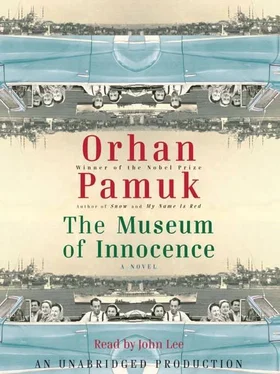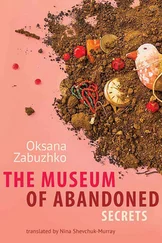But there was no reply.
One morning at the beginning of August I was forced to acknowledge that in spite of all my precautions and palliative measures, my pain, far from abating, was still increasing at a steady rate. If I was working in the office or talking on the phone, I did not think any new thought about Füsun, but the pain in my stomach would take on the form of some obsessive thought and race through my brain, silently, like an electric current, until I could think of nothing else. The various things I did to cultivate such small hopes as could allay the pain and distract me for a time were never effective for long.
I began to take an interest in coded messages, mysterious signs, and newspaper horoscopes. I put the most faith in the “Your Sign, Your Day” column in Son Posta and the astrologist of Hayat magazine. The cleverest astrologers would say to their readers, and most especially to me: “Today you will receive a sign from a loved one!” They said much the same thing to those born under other signs, but that was only right, as it takes two to make such an event happen; and I was so convinced I would read these horoscopes very carefully, but having no systematic belief in the stars, I did not spend hours playing with them, as bored housewives are given to do. My need was urgent. I made my own system of signification: I would say to myself, “If the next person who walks through that door is a female, then I shall be reunited with Füsun, and if it is a man, all will be lost.”
The world, life, all reality were swarming with signs sent by God so that we could discern our fortune. I would stand at the Satsat window, counting the cars as they passed, and I would say to myself: “If the first red car moving down the avenue has come from the left, I am going to have news from Füsun, and if from the right, my wait will continue.” Or I might divine: “If I am the first person to jump off the ferry when it lands, I’ll see Füsun soon.” And I would jump before they’d even thrown the rope. Behind me the rope men would cry: “The first person to jump to shore is a donkey!” Then I would hear a ship’s whistle, taking it for an omen, and I would imagine what sort of ship it was. I would tell myself, “If the number of steps in the overpass is an odd number, I’ll see Füsun soon.” If it turned out to be an even number, my agony would increase, but if the omen augured well I would enjoy a moment of relief.
The worst was the pain that woke me up in the middle of the night and would not let me get back to sleep. In such cases, I would drink rakı , and then, out of desperation, chase it with a few glasses of whiskey or wine, trying to silence my mind as if turning down the volume of a relentlessly blaring radio that was robbing me of my peace. Sometimes, with my mother’s old deck of cards and a glass of raki in my hand, I would play solitaire, trying to learn my fortune. Some nights I’d pick up the dice that my father played with only rarely and, telling myself that each time was the last, throw them a thousand times over. When I was well and truly drunk I would begin to take a strange satisfaction from my anguish, taking a foolish pride in my predicament, telling myself that it was worthy of a novel, a film, even an opera.
One night, while I was staying at the summer house in Suadiye, I awoke a few hours before dawn; when it became clear that sleep would not return, I tiptoed quietly through the darkness out to the terrace overlooking the sea; lying on a chaise longue, in the fragrant breeze of the pine trees, I gazed at the flickering lights of the Princes’ Islands and tried to lull myself to slumber.
“You can’t sleep either?” my father whispered. In the darkness I had not noticed him lying on the other chaise longue.
“I’ve been having some trouble lately,” I whispered guiltily.
“Don’t worry, it will pass,” he said softly. “You’re still young. It’s still very early for you to be losing sleep over this kind of pain, so don’t fret. But when you get to my age, if you have some regrets in life, you’ll have to lie here counting the stars until dawn. Beware of doing things that you might regret later.”
“All right, Father,” I whispered. It was not long before I sensed I might be able to forget my pain, if only for a while, and drift off. Here I display the collar of the pajamas my father was wearing that night, and one of his slippers, just the sight of which makes me sad.
Perhaps because I gave them no importance, or perhaps because I didn’t want readers and visitors to my museum to feel too much contempt for me, I have concealed a few habits picked up during this period, but now for the sake of my story’s integrity I feel obliged to make a brief confession about one of them. At lunchtime, when my secretary Zeynep Hanım went out with the rest of the office, I would sometimes dial Füsun’s number. It was never Füsun who answered, which told me that she had not yet returned from wherever she’d gone, and her father wasn’t around either. It was always Aunt Nesibe who picked up the phone, which meant that she was sewing at home, but I persisted in hoping that one day it would be Füsun who answered. Or at least that Aunt Nesibe, as she waited for the caller to speak, would let slip some facts about Füsun. Or that as I waited patiently, without saying a thing, Füsun would say something in the background. When Aunt Nesibe picked up the phone, there was a stretch of time when it was easy to be silent, but the longer and more exasperatedly she spoke, the harder it was to hold back, for Aunt Nesibe would quickly lose her nerve, succumbing to her panic as she writhed in a way that a telephone pervert would love: “Hello? Hello? Who is this? Who am I speaking to? For God’s sake, would you please say something? Hello, hello, who are you? Why are you calling?” She would make random arrangements, strings of such phrases, her fear and anger audible in every word, but it never occurred to her to hang up immediately, or at least before I did. Over time I began to feel sorry, even desperate, for this distant relation of mine acting like a trapped rabbit, and so I finally broke the habit.
There was no sign of Füsun.
AT THE end of August, as flocks of storks flew over the Bosphorus, the house in Suadiye and the Princes’ Islands, leaving Europe to fly for Africa, we decided, at my friends’ steady insistence, to go ahead with the end-of-summer party I was in the habit of giving in the empty apartment in Teşvikiye Avenue just before my parents’ return from their summer home. Sibel busied herself with the shopping, shifted the tables around, took the carpets out of mothballs and rolled them out over the parquet floors, and instead of going to help her, I again dialed Füsun’s home number for old times’ sake. For a few days now it had been ringing and ringing without answer, and that had worried me. This time, when I heard the broken tones that indicated the line was cut off, the pain in my stomach spread to every part of my body, every part of my mind.
Twelve minutes later, having passed through streets I’d been evading studiously since marking them in orange, I found myself walking like a wraith toward Füsun’s family’s house in Kuyulu Bostan Street. Looking up at the windows from a cautious distance, I could see that the curtains were gone. I rang the doorbell; no one answered. I knocked gently on the door before pounding it, and still no one answered, and I thought I was going to die. “Who’s there?” cried the janitor’s old wife from the dark basement apartment. “Haaa, the people in number three, they’ve moved. Those people have left.”
I told her I was interested in renting the apartment. Slipping her twenty lira, I used her key to let myself in. Dear God! How can I describe the loneliness of those empty rooms, or the state of the crumbling tiles in that tired and disintegrating kitchen, the dilapidated tub in which my lost love had bathed throughout her life, the mystery of the gas heater that had scared her so, the bare nails in the wall, and the shadows where for twenty years frames and mirrors had hung? The scent of Füsun in the rooms, the shadow falling in a corner, the layout of this house where Füsun had spent her whole life, these rooms that had made her the person she was, the walls and the flaking paint-I lovingly imprinted all these details in my memory. There was this wallpaper, of which I tore off a large piece to take with me. And the handle of the door to the small room I assumed had been hers-thinking about her hand grasping this handle for eighteen years, I pried it off and dropped it into my pocket. The porcelain handle of the toilet chain in the bathroom came loose even more easily.
Читать дальше












